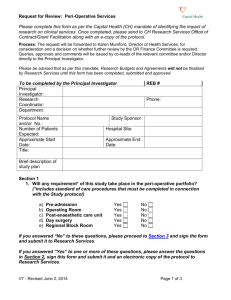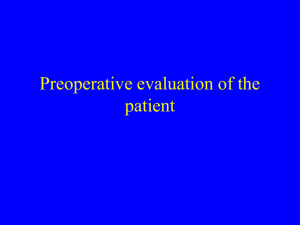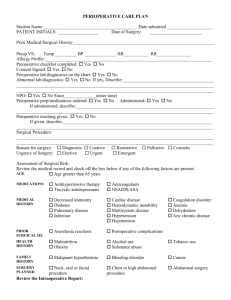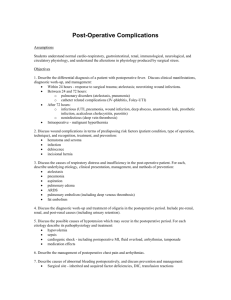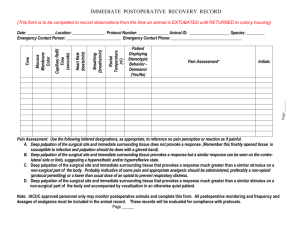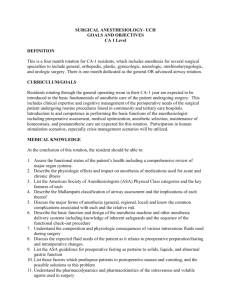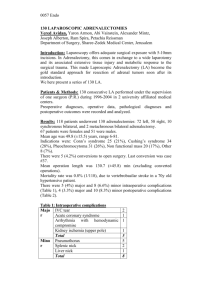Surgical Special Care Unit
advertisement
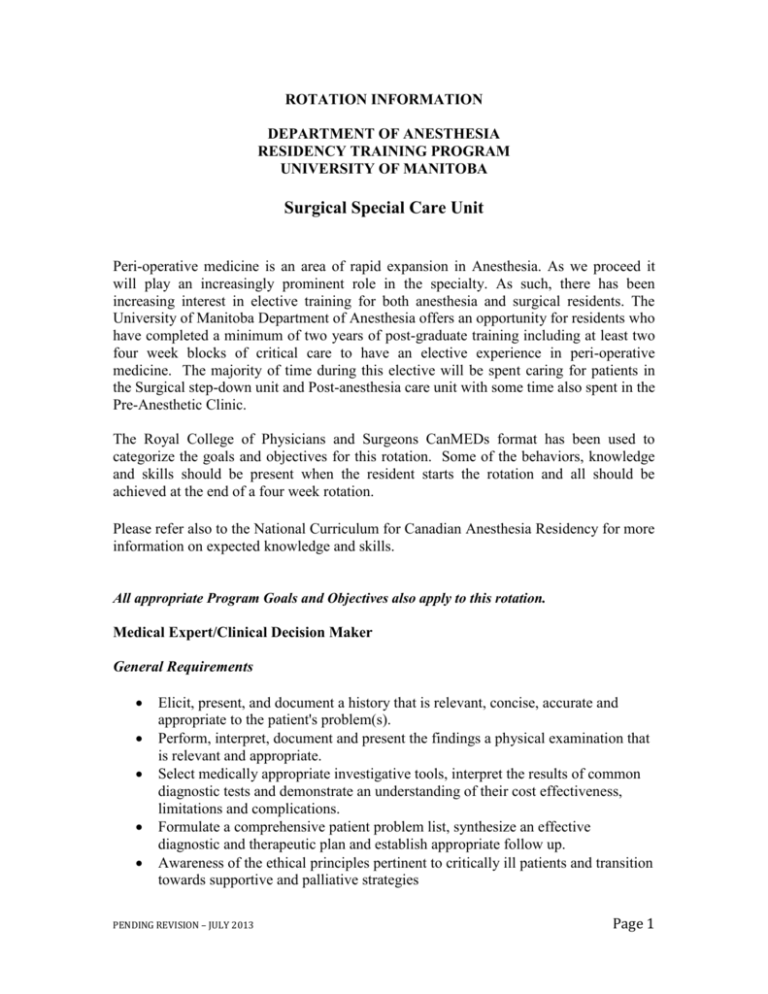
ROTATION INFORMATION DEPARTMENT OF ANESTHESIA RESIDENCY TRAINING PROGRAM UNIVERSITY OF MANITOBA Surgical Special Care Unit Peri-operative medicine is an area of rapid expansion in Anesthesia. As we proceed it will play an increasingly prominent role in the specialty. As such, there has been increasing interest in elective training for both anesthesia and surgical residents. The University of Manitoba Department of Anesthesia offers an opportunity for residents who have completed a minimum of two years of post-graduate training including at least two four week blocks of critical care to have an elective experience in peri-operative medicine. The majority of time during this elective will be spent caring for patients in the Surgical step-down unit and Post-anesthesia care unit with some time also spent in the Pre-Anesthetic Clinic. The Royal College of Physicians and Surgeons CanMEDs format has been used to categorize the goals and objectives for this rotation. Some of the behaviors, knowledge and skills should be present when the resident starts the rotation and all should be achieved at the end of a four week rotation. Please refer also to the National Curriculum for Canadian Anesthesia Residency for more information on expected knowledge and skills. All appropriate Program Goals and Objectives also apply to this rotation. Medical Expert/Clinical Decision Maker General Requirements Elicit, present, and document a history that is relevant, concise, accurate and appropriate to the patient's problem(s). Perform, interpret, document and present the findings a physical examination that is relevant and appropriate. Select medically appropriate investigative tools, interpret the results of common diagnostic tests and demonstrate an understanding of their cost effectiveness, limitations and complications. Formulate a comprehensive patient problem list, synthesize an effective diagnostic and therapeutic plan and establish appropriate follow up. Awareness of the ethical principles pertinent to critically ill patients and transition towards supportive and palliative strategies PENDING REVISION – JULY 2013 Page 1 Specific Requirements Describe the preoperative risk assessment of patients with regard to both preoperative patient risk factors and various surgical procedures. Perform preoperative patient assessments and develop management strategies with a view to risk stratification and management, medical optimization, anesthetic and postoperative planning. Manage high-risk surgical patients in the intraoperative and immediate postoperative period. Provide in-hospital anesthetic consultation for high risk patients. Describe the options available for postoperative analgesia, their advantages and disadvantages, including multimodal analgesia and select appropriate therapies for individual patients. Explain the concept of facilitated recovery, and how it is implemented with particular emphasis on Peri-operative nutrition Pain management and rehabilitation Identify, investigate and manage important postoperative complications, with particular emphasis on the following areas: Cardiac – recognition and management of patients with o Ischemia o Arrhythmias o Congestive heart failure Respiratory o Assessment and management of patients with or at risk of respiratory failure o Knowledge of non-invasive ventilation techniques o Interpretation of arterial blood gases Neurologic o Work-up and management of post-operative altered level of consciousness and delirium Infectious o Knowledge of antibiotic prophylaxis guidelines o Work-up and treatment of a pt with a fever o Goal directed therapy for sepsis o Broad spectrum antibiotic coverage for common peri-operative infections Renal o Assessment of volume status using invasive and non-invasive modalities o Indications and complications of the various volume expanders – i.e. crystalloid, colloid, albumin and blood products o Work-up and management of common electrolyte abnormalities o Management of patients with acute and chronic renal failure in the peri-operative setting PENDING REVISION – JULY 2013 Page 2 Hematologic o Indications and complications of transfusion of blood products o Work-up and management of common coagulation disorders o Work-up and management of peri-operative thromboembolic complications Gastrointestinal o Implications of peri-operative nutritional compromise o Treatment of ileus and constipation Communicator General requirements Establish a professional relationship with patients and families. Obtain and collate relevant history from patients, and families. Listen effectively. Discuss appropriate information with patients and families and other members of the health care team. Obtain complete informed consent for procedures performed Specific requirements Demonstrate consideration and compassion in communicating with patients and families. Demonstrate skills in: providing clear, concise and timely verbal and written communication as applied to progress notes, sign over of patient care and discharge planning; communication with patients and families regarding the medical condition, plan of treatment, prognosis, adverse events, medical uncertainty, medical errors and end of life wishes communication with families in such a way that encourages patient participation in decision-making, and to do this in consultative and emergent situations, and in challenging situations such as patient anger, confusion or language or ethno-cultural differences communication with other health care professionals regarding all aspects of patient care. PENDING REVISION – JULY 2013 Page 3 Collaborator General Requirements Collaborate effectively with the admitting service Consult effectively with other physicians and health care professionals. Contribute effectively to other interdisciplinary team activities. Specific Requirements Identify and describe the role, expertise and limitations of all members of an interdisciplinary team required to optimally achieve a goal related to patient care, or an administrative responsibility. Effectively collaborate with other allied health professionals, demonstrating the ability to accept, consider and respect the opinions of other team members, while contributing personal specialty-specific expertise Manage urgent and crisis situations such as cardiac arrest, trauma, anaphylaxis, and malignant hyperthermia, as a team member or a team leader Manager General Requirements Utilize personal resources effectively in order to balance patient care, continuing education, and personal activities. Allocate finite health care resources wisely. Work effectively and efficiently in a health care organization. Utilize information technology to optimize patient care, and life long learning. Specific Requirements Utilize appropriate time management for effective patient care, administrative duties and scholarly activities. Implement patient care practices considering available health care resources. Able to complete the tasks discussed on rounds in a timely manner. Able to seek help appropriately and appreciate their personal limitations. Health Advocate General Requirements Identify the important determinants of health affecting patients. Contribute effectively to improved health of patients and communities. Recognize and respond to those issues where advocacy is appropriate. PENDING REVISION – JULY 2013 Page 4 Specific Requirements Educate patients and families about and promote the importance of long-term healthy behaviours and preventive health care (e.g. smoking cessation, screening tests, vaccinations, exercise, and nutrition). Respect and empower patient autonomy. Promote equitable health care. Apply the principles of quality improvement and quality assurance Identify and react to risks to other health care providers including, but not limited to: o Substance abuse among health care providers o Dangers to workplace safety and health Scholar Develop and maintain a personal learning strategy which will continue to maintenance of certification Seek out and critically appraise literature to support clinical care decisions and practice evidence based application of new knowledge Contribute to the appropriate application, dissemination, and development, of new knowledge Teach medical students, other residents, faculty members, other health professionals, and patients using the principles and methods of adult learning Professional Deliver the highest quality patient care with integrity, honesty, and compassion Fulfill the ethical and legal aspects of patient care Maintain patient confidentiality Demonstrate appropriate interpersonal and professional behaviourRecognize personal limits through appropriate consultation (with staff supervisors, other physicians, and other health professionals) and show appropriate respect for those consulted Recognize conflict in patient care situations, professional relationships, and value systems, and demonstrate the ability to discuss and resolve differences of opinion. Accept constructive feedback and criticism, and implement appropriate advice Continually review personal and professional abilities and demonstrate a pattern of continuing development skills and knowledge through education Identify problems of physical and mental health including chemical dependence, stress, and depression, and ways to deal with these problems in oneself and others PENDING REVISION – JULY 2013 Page 5 PENDING REVISION – JULY 2013 Page 6
